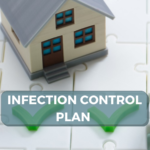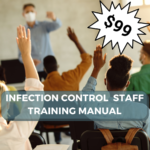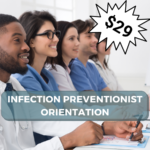Stay Safe During the 2022-2023 Flu Season!
Since we’ve been concerned with COVID for nearly three years, it can be easy to forget about the flu, which is responsible for an average of 80,000 deaths per year in long-term care.
What is the Flu?
Influenza is a highly contagious viral infection that affects the respiratory system. It can cause mild to severe illness and is marked by fever, headaches, achy muscles, and extreme fatigue.
Influenza is one of the most common and potentially serious diseases to occur in residential care.
The flu is caused by one of four Influenza viruses: A, B, C, and D. Influenzas A, and B are the sources of flu epidemics every annual flu season. The flu virus enters through the nose, mouth, or eyes, usually via droplets expelled when an infected person sneezes, coughs, or talks. The virus can also be picked up by touching an infected surface (doorknobs, countertops, or light switches, for example). The virus attacks the body’s cells in the respiratory system‐‐the nose, throat, and lungs.
Anyone can get the flu. Those most vulnerable to infection include the very young and the very old, and people who have not been vaccinated annually.
How does the flu spread?
The flu spreads from person to person mainly by droplets that are made when people cough, sneeze or talk. These droplets can land in the mouths or noses or eyes of people who are nearby (typically within 6 feet) or be inhaled into the lungs. It is less likely, but still not impossible, for someone to catch the flu by touching a surface or object.
People with the flu are considered contagious typically one day before symptoms develop and up to 7 days after becoming sick. The first 3 or 4 days after symptoms begin people are considered the most contagious.
What are the symptoms?
People who have the flu usually experience some or all of these symptoms:
- Fever
- Cough
- Sore throat
- Nasal congestion
- Muscle or body aches
- Chills
- Headache
- Fatigue
- Diarrhea and vomiting (usually only in children)
Elderly persons with influenza might have other, more subtle symptoms, such as changes in mental status. They might not have a fever.
Reporting an Outbreak
If a flu outbreak occurs within your facility, you must report this to your local public health officials and LPA within one business day, or as soon as possible. You can find your local public health office by county here.
Each county has different guidelines on what an outbreak is. Your local public health officials and LPA will know the number of confirmed cases that establish an outbreak for your area.
Learn more about the 2022-2023 Flu Season
FAQ About the 2022-2023 Flu Season from the CDC CDC Tips to Prevent the Flu The Difference Between Flu and COVID-19 The Difference Between Cold and Flu The Flu in Long-Term Care
New legislation requires all licensed adult and senior care facilities to submit an Infection Control Plan.
The Plan must include:
- Facility policy for following the required infection control procedures
- Specific plans for infections, outbreaks, and states of emergency
- Designation of an Infection Preventionist
- Initial and annual training for all staff
- Plans for the annual review of infection control procedures

This Infection Control Plan is a component of your facility’s Plan of Operation. This does not replace your existing LIC 808 COVID-19 Mitigation Plan. The LIC 808 COVID Mitigation Plan must be kept on file and updated until the declared state of emergency ends.

Our infection control staff training manual:
- Meets staff infection control requirements laid out by Title 22
- Can be used for both new hire and annual training
- Includes lessons, final exam, training documentation, and certificate of completion

Our Infection Preventionist Orientation course will inform your IP of the latest requirements, procedures, and strategies for coping with the unexpected. Also included is a ‘train-the-trainer’ session, with tips and tricks for adult learning and on-the-job training of staff.
Approved for: (Regulations) Adult Residential Facility (36314) | Residential Care Facility for the Elderly (36315) | Group Home (36316) | Short-Term Residential Therapeutic Program (36317) | Board of Registered Nurses
